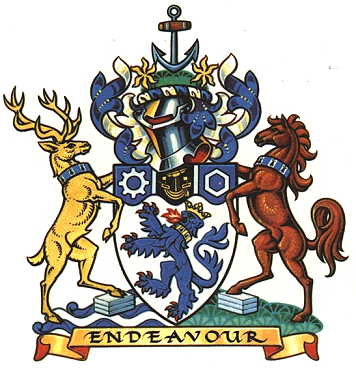Cleveland: Difference between revisions
Knorrepoes (talk | contribs) No edit summary |
Knorrepoes (talk | contribs) No edit summary |
||
| Line 7: | Line 7: | ||
'''CLEVELAND''' | '''CLEVELAND''' | ||
Additions : 1974 Parts of [[Durham]] and [[Yorkshire - North Riding]] <br> | Additions : 1974 Parts of [[Durham (County)]] and [[Yorkshire - North Riding]] <br> | ||
Abolished 1996 | Abolished 1996 | ||
Revision as of 14:31, 31 December 2012
| Heraldry of the World Civic heraldry of the United Kingdom |
CLEVELAND
Additions : 1974 Parts of Durham (County) and Yorkshire - North Riding
Abolished 1996
Official blazon
Arms : Argent a Lion rampant Azure crowned Or and gorged with a Collar compony Ermine and Or breathing Flames proper on a Chief wavy Azure on a Pale Sable fimbriated between on the dexter a Cogwheel and on the sinister a voided Hexagon Argent an ancient Ship sails furled pennons flying Or.
Crest : On a Wreath of the Colours on a Grassy Mount an Anchor proper between two Estoiles Or.
Supporters : On the dexter side a Hart Or and on the sinister side a Cleveland Bay Horse proper both gorged with a Collar compony Ermine and Azure and resting their interior hind hooves on three Ingots of Steel proper the whole upon a Compartment per pale of a Grassy Mount and Waves of the Sea proper.
Motto : 'ENDEAVOUR'
Origin/meaning
The arms were officially granted on December 10, 1974.
The blue lion is from the arms of the Brus family who, following the Norman Conquest, were given substantial lands in what is now Cleveland, and its collar and crown are similar to those in the heraldry of the Dukes of Cleveland. Charles II created Barbara Villiers Duchess of Cleveland in 1670 and their illegitimate son became the first Duke upon the death of his mother in 1709. The flames symbolize the energy industry generally, the ancient ship represents shipping, the cogwheel - engineering and the hexagon - the petro-chemical industry. The two vertical lines separating these symbols represent the railways and are a reminder that the World's first passenger railway had its terminus at Stockton-on-Tees.
The anchor resting on the grassy mount represents the sea and the golden 'estoiles' are identical to the polar stars in the arms of Captain Cook, but are blazoned as estoiles as they are not in a North-South position.
The supporters consist of a Hartlepool hart and a Cleveland Bay horse, each with a hoof resting on three steel ingots, representing the iron and steel industry.
The motto "Endeavour" was chosen not only for its obvious message but because Endeavour was the name of Captain James Cook's ship.
Literature : Image and information provided by Laurence Jones
